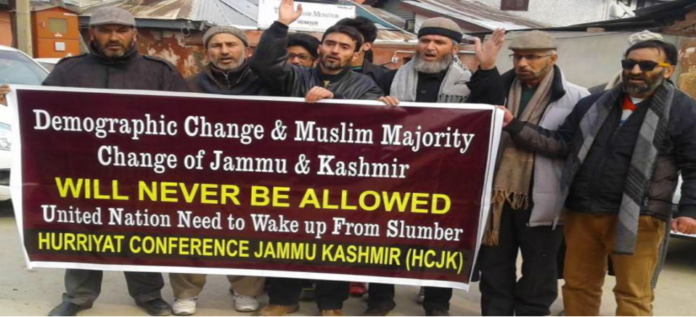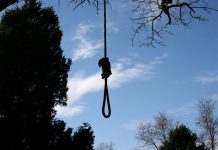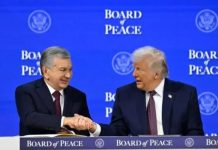By: Dr. Sahibzada Muhammad Usman
Kashmir is the Indian subcontinent’s most northern geographical area. Before 1947, “Kashmir” only meant the valley between the Pir Panjal Range and the Great Himalayas. Currently, the word refers to a broader region encompassing the Indian-occupied areas of Ladakh and Jammu and Kashmir, the Pakistani-administered regions of Gilgit-Baltistan and Azad Kashmir, and the Chinese-administered regions of the Trans-Karakoram Tract and Aksai China.
The plan to abolish Jammu and Kashmir’s status has been on the Bharatiya Janata Party’s (BJP) platform for many years. Invigorated by its victory in May 2019 and further motivated by its Hindu ideology, the BJP attacked Kashmir as an authoritarian state. New Delhi revoked the state’s distinctive status and statehood, dividing Jammu and Kashmir into Ladakh and Jammu and Kashmir; both were governed directly by the central government using an undemocratic lieutenant governor. In addition, the authorities imprisoned the entire political elite of Kashmir, including three previous chief ministers. Before its dissolution, the state legislature deprived citizens of an elected local administration.
After more than three years, Kashmiri Muslims are still enraged and fearful, and their hostility toward New Delhi has grown as a result of several actions implemented by the government after the 2019 movements. Modi’s government has implemented extensive legal and administrative reforms, leading to worries that it is engaging in demographic engineering. The Jammu and Kashmir Languages Act 2020 was approved on September 26, 2020, making Hindi one of the territory’s official languages. The Union Territory of Jammu and Kashmir Reorganization Fifth Order, 2020, was approved by India on October 26, 2020, allowing non-natives to acquire property in Jammu and Kashmir. Indians from other areas of the nation can purchase property, get residence privileges, and seek government positions for the first time. In addition to removing Kashmiri Muslims from key posts in the local police and administration, the federal government has brought in outsiders to implement its objective. These regulations intend to alter Jammu and Kashmir’s linguistic and demographic landscape, and the United Nations has expressed alarm.
In 2021, the UN Special Rapporteur on freedom of religion and minority issued a joint statement declaring that the modifications in the territory posed a threat to minority rights and urging India to defend the cultural, social, and economic rights of Kashmiris. In addition, they stated, “The loss of freedom and the encroachment of direct rule by New Delhi implies that the people of IIOJK no longer possess their democratic rights and have lost the ability to amend or legislate laws in the region to safeguard their freedoms as minorities.” These legal amendments make it easier for persons who aren’t from Jammu and Kashmir to live in the territory, alter the region’s demography, and impede the capacity of minorities. They also voiced worry that the frequency of successful applications for domicile from outside the area may indicate that demographic shifts based on language, religion, and ethnicity have already begun. The wording chosen by the Special Rapporteurs is significant, and the inference is clear: India violates the self-determination rights of Kashmiris by altering the region’s demography. The later violates Article 49 of the Fourth Geneva Convention blatantly.
In May 2021, the official government site also described Jammu and Kashmir as having a primarily Hindu population. The InvestJK website, managed by the Department of Industries and Commerce, claimed in a segment on the region’s temples that “whether in Jammu, the majority is largely Hindu.” According to the official 2011 Jammu and Kashmir statistics, 68.31% of the area is Muslim, and 28.44% comprises Hindu. In light of the BJP’s persistent intention to expel Muslims from the region, the phrase was horrible in light of heightened worries about the demographic shift.
The Indian electoral commission permitted security troops stationed in Kashmir and immigrants working in the territory to vote in local legislative elections, a decision that would raise Kashmir’s voters by 2.5 million. The statement sparked worries that the move will empower the Bharatiya Janata Party administration to change the demographics of the Muslim-majority province. This scenario has been anticipated since the territory’s autonomy was revoked.
Former Jammu and Kashmir chief minister Farooq Abdullah alerted reporters that granting voting access to non-citizens will put tomorrow’s parliament in the hands of strangers. “The number may reach 50 lakhs or 1 million by tomorrow. J&K’s reputation is under direct attack,” he remarked.
Subhash Gupta, a policy analyst and attorney from Jammu, said, “The populace is filled with anxiety.” “This is an effort to alter the region’s electoral demographics. It seems to be the case.”
Dr. Radha Kumar, an ex-spokesperson for Jammu and Kashmir designated by the Indian government, said that “the worry of the political groups in Jammu and Kashmir is warranted considering the actions of the Modi government since 2019.” “Every concern is warranted,” she said. Current policy dictates that military members may only poll in their home states.

In December 2020, local elections were conducted to elect rural development authorities. Outsiders were unexpectedly called, and parties had just one week to enter candidates before voting started. The New York Times published that “thousands of political staff for the Bharatiya Janata Party traveled through the area carrying signs and banners, hoping to establish a powerful showing in a predominantly Muslim territory that has historically been reviled.” The BJP finally won 3 of 280 seats. One of few foreign media sources permitted to visit the area on what it termed “a strictly regulated, government-organized tour,” the New York Times referred to the BJP’s victory of three out of 280 seats as “some breakthroughs.” This statement’s use to express can be seen as a complete failure, and Kashmiris’ dismissal of the BJP is perplexing and quite unsettling.
According to official figures, around 3,800 Kashmiri pundit households have been rehabilitated. Approximately 44,000 Kashmiri pundit households got INR 13,000 per month, and approximately 6,000 employments were established for them, 3,800 of which have been distributed. In contrast to the lucrative promises made to Kashmiri pundits, the relocated Muslim people of the Gujarat riots were granted a meager INR 500/- stipend, which was afterward terminated, and their shelters were also forcibly shut down. Approximately 60,000 households relocated from the Kashmir valley and relocated in Jammu and its surrounding districts, as reported by the Government of IIOJK Relief and Rehabilitation. Twenty-three thousand migrant people settled outside the Indian – Administered Kashmir state. After they fled the valley, several states reserved seats for them in medical and engineering programs, which remain to this day. However, a Kashmiri Muslim family must relocate their children and pay close to Rs 50 lakhs to ensure their admission to other nations.
Pakistan has expressed willingness to engage in dialogue with India, provided India reconsiders its current actions in IIOJK. These steps include the reversal of Article 370’s repeal, restoring the demographic shifts, it is implementing and lowering military numbers in the area. Pakistan has always guaranteed that the colonization and illegal invasion of IIOJK stay in the spotlight, and the international community must take a position.
It is now clearly evident that, over time, India implemented targeted, systematic administrative and legislative actions to alter the demographics of IIOJK in order to influence the eventual resolution of the Kashmir issue if and when the prospect of a UNSC-mandated plebiscite is exercised. These unilateral Indian actions would also have a detrimental impact on ties between India and Pakistan, leading to an increase in ceasefire breaches, the possibility of outright conflict between the two nations, and an increase in Indian participation in fomenting unrest in Pakistan. Additionally, it is anticipated that these policies will have a detrimental impact on Kashmiri society since they will likely disrupt communal peace in Kashmir and increase bloodshed and militancy.
Suggestion:
- Russia, the European Union, China, and the United States should use their regular interactions with New Delhi and Islamabad to actively promote the nuclear-armed neighbors to move toward the normalization of diplomatic ties, more formal bilateral gatherings, and a faster pace of trust-building meetings. It should continue to guarantee effective lines of communication regarding IIOJK in the event of a significant military crisis.
About Author:
Dr. Sahibzada Muhammad Usman
Research Scholar and Academic; Ph.D. in Political Science at the University of Pisa, Italy. Dr. Usman has participated in various national and international conferences and published 30 research articles in international journals.






